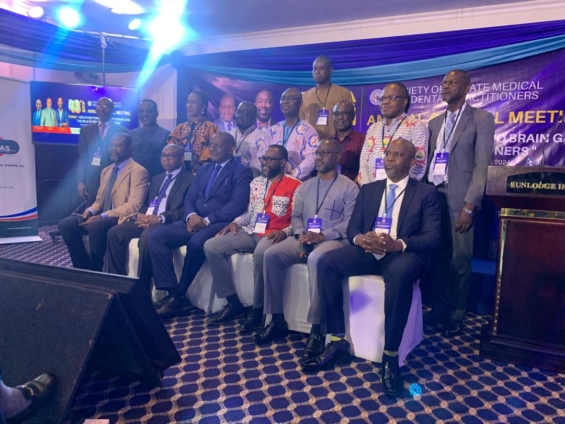
Audio By Carbonatix
The President of the Pharmaceutical Society of Ghana, Pharm Dr. Samuel Kow Donkoh, has revealed that the last time the government employed pharmacists in the Ghana Health Service was in 2020.
According to him, with the government being the biggest employer in the country, many pharmacists have been rendered jobless which is worrying.
“Since the year 2020, pharmacists have not had any permanent employment in the Ghana Health Service. So if the government, being the biggest employer, has not employed any pharmacists into permanent jobs, then it is quite a worrying situation for us,” he said.
Pharm Dr. Donkoh made this revelation when speaking at the 43rd Annual General Meeting (AGM) of the Society of Private Medical and Dental Practitioners (SPMDP).
The four-day event themed, “Health Sector Brain Drain to Brain Gain: The Role of the Private Practitioners”, brought together members of the Society and other sister associations and unions to brainstorm on a sustainable solution for the canker.
In the view of Pharm Dr. Donkoh, the mismatch between the number of healthcare practitioners being produced and the available job opportunities is a significant issue.
“Brain drain is quite a worrying situation for all of us. Not just the medical doctors but the entire healthcare professionals,” he said on Friday.
Pharm Dr. Donkoh pointed out that with eight pharmacy institutions in Ghana, approximately 1,000 pharmacists graduate each year.
However, for the past four years, the government has not offered any permanent positions to these new professionals.
This lack of opportunities is driving many young pharmacists to seek employment abroad, exacerbating the brain drain problem that is already affecting the health sector.
“People would want to stay and work, but the job opportunities are not available, and even when they are here, pharmacists are not adequately remunerated. These are the two factors that are pushing our members out of the country,” he explained.
To address this issue, Pharm Dr. Donkoh called on the government to make a conscious effort to employ pharmacists.
He suggested that employing 400 to 500 pharmacists annually would ensure that every health facility in the country has a pharmacist.
“Anywhere medicines are being dispensed, we need to make sure that there is a pharmacist. Not only will pharmacists be available in the pharmacy department, but they will also be at the various wards to provide pharmaceutical services,” he noted.
Pharm Dr. Donkoh also highlighted the role of the private sector in creating job opportunities for pharmacists.
He urged regulators to create an enabling environment for the engagement of more pharmacists in the private sector.
“The law states that ‘Anytime a pharmacy is opened, there should be the presence of a pharmacist’. If the regulator insists on that, it will create employment opportunities for our members,” he said.
He further suggested that over-the-counter medicine sellers should upgrade to full pharmacies and employ pharmacists.
“At the time they were granted licenses to operate as over-the-counter medicine sellers, Ghana had only one Pharmacy School, KNUST, which produced about 50 pharmacists a year. Today, we have eight pharmacy schools producing about 1,000 to 1,500 pharmacists annually.
“With these figures, we shouldn’t be finding over-the-counter medicine sellers in the regional capitals and others. All these people need to upgrade into pharmacies and employ pharmacists to create more job opportunities,” he intimated.
On her part, the President of the Ghana Registered Nurses and Midwives Association (GRNMA), Perpetual Ofori-Ampofo, was also concerned about the alarming rate of nurses' immigration.
According to her, the mass departure of nurses has created gaping holes in the healthcare system, leading to an unsustainable workload for those remaining.
“The immigration of our colleagues is a threat to the safety of our patients and our safety as health practitioners.
“Their departure has caused serious gaps within the health system because the workload of those at post has increased, and this may cause you to make wrong decisions or cause medical errors at one point or another.”
Echoing the concerns of Madam Ofori-Ampofo, Dr. Cecilia Kakraba Quashie, President of the Ghana Dental Association, highlighted the importance of mentorship as a strategy to mitigate the effects of brain drain.
“I strongly believe that intentional mentorship is a crucial element missing in our healthcare profession. I implore each of you to take up the mantle of mentorship, guiding, and supporting at least one young professional in our various fields.
“By so doing, we can foster a culture of knowledge-sharing, growth, and collective success, and hopefully, this will help some of our young people to stay here,” she said.
Latest Stories
-
Adom FM’s ‘Strictly Highlife’ lights up La Palm with rhythm and nostalgia in unforgettable experience
2 hours -
Ghana is rising again – Mahama declares
5 hours -
Firefighters subdue blaze at Accra’s Tudu, officials warn of busy fire season ahead
6 hours -
Luv FM’s Family Party In The Park ends in grand style at Rattray park
6 hours -
Mahama targets digital schools, universal healthcare, and food self-sufficiency in 2026
6 hours -
Ghana’s global image boosted by our world-acclaimed reset agenda – Mahama
7 hours -
Full text: Mahama’s New Year message to the nation
7 hours -
The foundation is laid; now we accelerate and expand in 2026 – Mahama
7 hours -
There is no NPP, CPP nor NDC Ghana, only one Ghana – Mahama
7 hours -
Eduwatch praises education financing gains but warns delays, teacher gaps could derail reforms
7 hours -
Kusaal Wikimedians take local language online in 14-day digital campaign
8 hours -
Stop interfering in each other’s roles – Bole-Bamboi MP appeals to traditional rulers for peace
8 hours -
Playback: President Mahama addresses the nation in New Year message
9 hours -
Industrial and Commercial Workers’ Union call for strong work ethics, economic participation in 2026 new year message
11 hours -
Crossover Joy: Churches in Ghana welcome 2026 with fire and faith
11 hours

